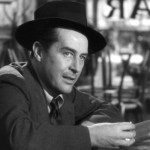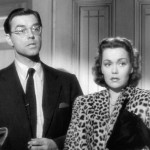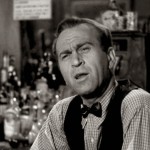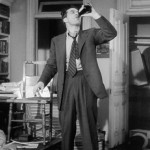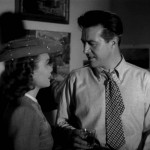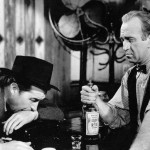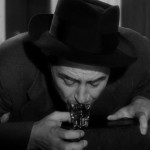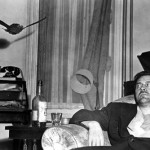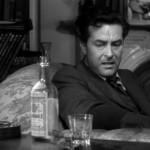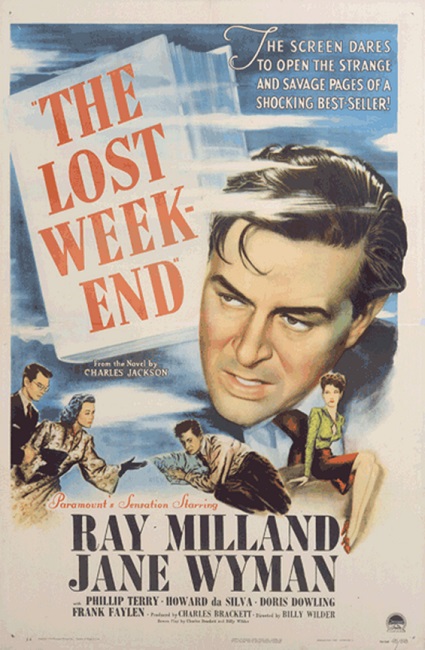
The Lost Weekend – 1945
I can see why The Lost Weekend won the Academy Award for Best Picture, because it dealt with a subject that is very serious: alcoholism. Even today, alcoholism afflicts roughly 18 million people in the United States alone. The movie pulled no punches and attempted to show the frightening depths to which a true drunk on a drinking binge will sink. The results were pretty ugly, and made all the more so because they were so realistic. To put it simply: alcoholism ruins lives.
The film starts out as Don Birnam, played by Ray Milland, is packing to go on a trip out of town with his brother. He makes a point of telling him that he hasn’t had a drink in ten days. But his brother Wick, played by Phillip Terry, is skeptical. Right from the very beginning, it is clear that Don is hiding something, lying to his brother, and is dying for a drink. He has hidden a bottle of Whisky by hanging it outside the window, but Wick finds it and pours it down the drain. His girlfriend Helen, played by Jane Wyman, arrives to see them off. Like Wick, she is also painfully aware that Don has a drinking problem, but is desperate to believe the best of her man.
The film wastes no time in showing that Don has a very serious problem. You see, Don is no ordinary drunk. Don is the kind of alcoholic that would put a dope fiend to shame. From the very beginning, he is already at the point where he is prepared to beg, lie, cheat, and steal for a drink. He has no concern for those around him and is only concerned with one thing – that next drink. When he is finally left alone, he searches the apartment in vain for any drop of alcohol that he might have hidden – anything that his brother might not have found. My first thought was that Millan was portraying the character and his behavior so completely over the top that it seemed unrealistic. But then I remembered a documentary I once saw about alcoholism and substance abuse, and the lengths to which addicts will go for their drug of choice, and it started to make a lot more sense. If his alcoholism had reached that point, his behavior was all too real.
The movie is based on a book of the same name, written by Charles R. Jackson. Apparently, the movie follows the book pretty well with very few deviations. The book was so well written and realistic, some have even said that it “was obviously semi-autobiographical.” However, it is interesting to note one minor difference. In the book, the character of Don Birnam is described as being tormented by a homosexual incident he’d had in college. They left that alone, and I don’t think the film suffered for it.
The movie was very well done in that it showed the how low alcoholics are able to sink. The begging, lying, cheating, and stealing were all there, but it got even worse, even to the point of horrific hallucinations and suicide attempts. His brother got fed up and abandoned him to his fate. And even his girlfriend was ready to do the same until she learned that he planned to kill himself. But the film ended with a ray of hope. Helen returns to stop him. She even desperately tries to get him to drink more alcohol, saying that she would rather have him drunk than dead.
It was a god movie, being neither polite nor pretty. Instead, it was gritty and real. The acting was good and the characters believable. Here is where I think the movie turns a little strange, and perhaps fails to translate for a modern audience. The music. For me, the soundtrack didn’t really seem to fit the story. It was creepy music that would have been appropriate for an old Hollywood monster movie like The Creature From the Black Lagoon or The Mummy, not a serious drama about a raging alcoholic on a four day drinking binge.
The soundtrack employed an electronic instrument called a theremin which was supposedly used to create the pathos of alcoholism. All it did for me was to remind me of Plan 9 from Outer Space. The theremin makes a sound that is wobbly and high-pitched, eerie and other-worldly. I kept expecting a slow close-up of a monster lurking in the closet. But when the horror movie music played, they would start panning in for an extreme close-up on a glass of rye, as if maybe the alcohol itself was the monster. Maybe the music might have been effective for 1945. After all, The Lost Weekend was one of the first movies to employ the theremin as part of the soundtrack. But by today’s standards, it didn’t seem to fit the film.
Another character in the film that I enjoyed watching was Nat, the local bar tender that gets Don started on his binge, played by Howard Da Silva. He does everything a friendly bartender should do. He is a good server and an attentive listener. When he realizes that Don has gone completely off the deep end, he gives him one last shot before cutting him off and encouraging him to get some help. That showed a certain amount of compassion and the desire to help out his friend. Well done, Howard.
The subject of alcoholism is a difficult and serious one, and the movie was not afraid to show some of the seedier sides of the disease. It was not always comfortable to watch, and as such it achieved its goal. The hallucination scene was particularly disturbing. But I think it was worthy of the Best Picture Academy Award it won.
Interesting note: The day after the Oscar Ceremonies, Director, Billy Wilder, and Producer, Charles Brackett returned to work at the film studio complex. They noticed that co-workers had hung empty alcohol bottles outside the office windows in homage to the Best Picture win.
